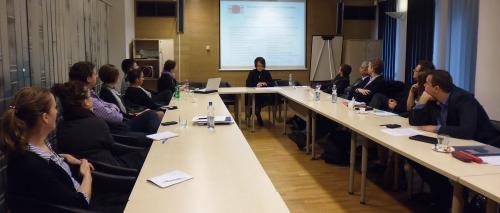EHRI: An Alternative to Fragile or Missing Institutional Networks. Report EHRI Workshop 'Overcoming the Gap'

Report on the EHRI workshop Overcoming the Gap: Eastern Perspectives on EHRI
László Csősz, Hungarian National Archives
The last event in the series of international workshops to disseminate the achievements of the EHRI project took place in the Holocaust Memorial Center in Budapest on November 6, 2014. The workshop Overcoming the Gap: Eastern Perspectives on EHRI was held in cooperation with the NIOD Amsterdam and the Hungarian National Archives.
Two major objectives
The workshop had two major objectives. First, it provided the participants with an overview on the history and present state of the Holocaust and Genocide scholarship in Slovakia, Romania and Hungary. Besides a long common history, these states also share a Holocaust history and show many parallels in the development of nationalism and antisemitic ideologies. Furthermore, the example of the three countries demonstrates that Holocaust-era archival records quite often need complex and transnational approaches and intensive scholarly cooperation.
Second, the workshop summarized EHRI's progress and main results, featuring speakers from key areas of the collaboration's development.
Situation of Hungarian Holocaust scholarship
The participants were welcomed by László Csősz, Hungarian National Archives, co-organizer of the workshop, who also gave the introductory lecture on the situation of Hungarian Holocaust scholarship and discussed the potential of EHRI to improve the conditions in this region that are in several respects are unfavourable for the development of Holocaust research and studies of modern history in general.
Slovakia and Romania
He was followed by Barbara Hutzelmann (Editionsprojekt “Judenverfolgung 1933-1945”) and Alexandru Climescu (Elie Wiesel National Institute for Studying the Holocaust in Romania, Bucharest), who gave succinct overviews on the evolution of Holocaust Research and Documentation in Slovakia and Romania.
Outcome of EHRI
The second session of the workshop was devoted to the dissemination of the main outcomes of EHRI. Giles Bennett (Institute für Zeitgeschichte, Munich) summarized EHRI’s efforts to identify Holocaust sources scattered in a number of archives and other collection-holding institutions across Europe.
Wolfgang Schellenbacher (Jewish Museum in Prague) focused on trans-institutional research guides and the challenges of connecting and displaying information from dispersed sources.
Finally, Reto Speck (Kings College, London/NIOD Amsterdam) gave a presentation on one of EHRI’s main achievements, the online portal that brings together all the results produced across the project and will be introduced to the public at the launch event of EHRI in Berlin in March 2015.
Problems addressed during the discussion included:
- conflicting memorial policies and difficulties in coming to terms with the past in former Communist countries;
- the opportunities and perspectives offered by EHRI, especially for emerging scholars in this field;
- the plans for the continuation of EHRI, which would include partners from all the three countries;
- characteristics of, and difficulties, in archival access;
- digitalization projects;
- as well as the political milieu surrounding Holocaust remembrance and research in Central and Eastern Europe.
Scholarly integration
Participants concluded that EHRI can offer an alternative to fragile or missing institutional networks and would greatly contribute to scholarly integration of local Holocaust scholarship into national historiographies as well as into international trends.
Participants of the workshop were from eight countries and represented EHRI partners and other leading institutions in the field from Hungary and abroad, including the Wiener Library in London, as well as the Central European University, the Hungarian National Archives, the University of Szeged and the Eötvös Loránd University.
Read the workshop programme.
Photo from the Holocaust Memorial Center (Zoltán Tóth). Barbara Hutzelmann presents at the EHRI workshop.
